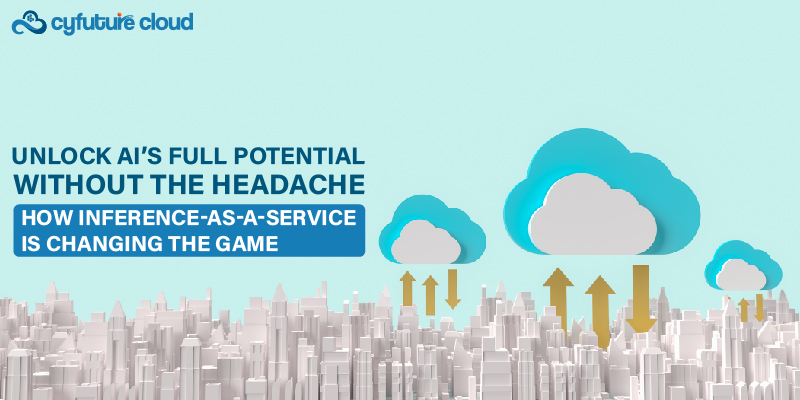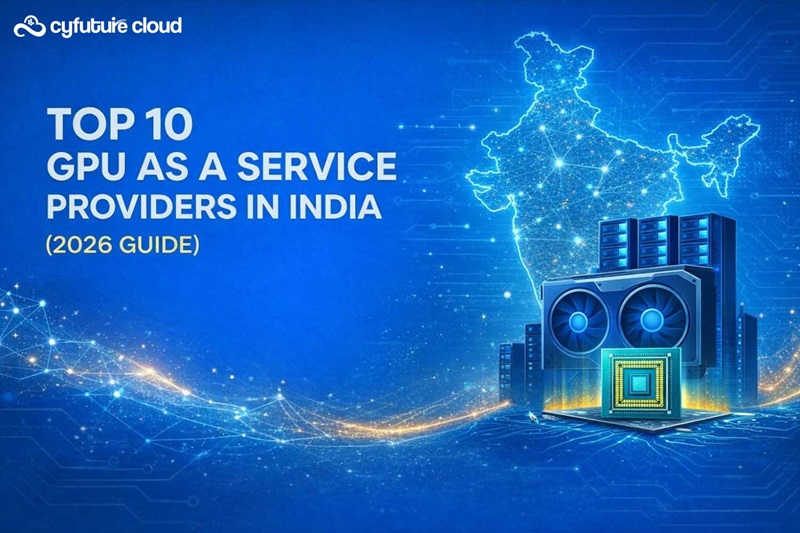Get 69% Off on Cloud Hosting : Claim Your Offer Now!
- Products
-
Compute
Compute
- Predefined TemplatesChoose from a library of predefined templates to deploy virtual machines!
- Custom TemplatesUse Cyfuture Cloud custom templates to create new VMs in a cloud computing environment
- Spot Machines/ Machines on Flex ModelAffordable compute instances suitable for batch jobs and fault-tolerant workloads.
- Shielded ComputingProtect enterprise workloads from threats like remote attacks, privilege escalation, and malicious insiders with Shielded Computing
- GPU CloudGet access to graphics processing units (GPUs) through a Cyfuture cloud infrastructure
- vAppsHost applications and services, or create a test or development environment with Cyfuture Cloud vApps, powered by VMware
- Serverless ComputingNo need to worry about provisioning or managing servers, switch to Serverless Computing with Cyfuture Cloud
- HPCHigh-Performance Computing
- BaremetalBare metal refers to a type of cloud computing service that provides access to dedicated physical servers, rather than virtualized servers.
-
Storage
Storage
- Standard StorageGet access to low-latency access to data and a high level of reliability with Cyfuture Cloud standard storage service
- Nearline StorageStore data at a lower cost without compromising on the level of availability with Nearline
- Coldline StorageStore infrequently used data at low cost with Cyfuture Cloud coldline storage
- Archival StorageStore data in a long-term, durable manner with Cyfuture Cloud archival storage service
-
Database
Database
- MS SQLStore and manage a wide range of applications with Cyfuture Cloud MS SQL
- MariaDBStore and manage data with the cloud with enhanced speed and reliability
- MongoDBNow, store and manage large amounts of data in the cloud with Cyfuture Cloud MongoDB
- Redis CacheStore and retrieve large amounts of data quickly with Cyfuture Cloud Redis Cache
-
Automation
Automation
-
Containers
Containers
- KubernetesNow deploy and manage your applications more efficiently and effectively with the Cyfuture Cloud Kubernetes service
- MicroservicesDesign a cloud application that is multilingual, easily scalable, easy to maintain and deploy, highly available, and minimizes failures using Cyfuture Cloud microservices
-
Operations
Operations
- Real-time Monitoring & Logging ServicesMonitor & track the performance of your applications with real-time monitoring & logging services offered by Cyfuture Cloud
- Infra-maintenance & OptimizationEnsure that your organization is functioning properly with Cyfuture Cloud
- Application Performance ServiceOptimize the performance of your applications over cloud with us
- Database Performance ServiceOptimize the performance of databases over the cloud with us
- Security Managed ServiceProtect your systems and data from security threats with us!
- Back-up As a ServiceStore and manage backups of data in the cloud with Cyfuture Cloud Backup as a Service
- Data Back-up & RestoreStore and manage backups of your data in the cloud with us
- Remote Back-upStore and manage backups in the cloud with remote backup service with Cyfuture Cloud
- Disaster RecoveryStore copies of your data and applications in the cloud and use them to recover in the event of a disaster with the disaster recovery service offered by us
-
Networking
Networking
- Load BalancerEnsure that applications deployed across cloud environments are available, secure, and responsive with an easy, modern approach to load balancing
- Virtual Data CenterNo need to build and maintain a physical data center. It’s time for the virtual data center
- Private LinkPrivate Link is a service offered by Cyfuture Cloud that enables businesses to securely connect their on-premises network to Cyfuture Cloud's network over a private network connection
- Private CircuitGain a high level of security and privacy with private circuits
- VPN GatewaySecurely connect your on-premises network to our network over the internet with VPN Gateway
- CDNGet high availability and performance by distributing the service spatially relative to end users with CDN
-
Media
-
Analytics
Analytics
-
Security
Security
-
Network Firewall
- DNATTranslate destination IP address when connecting from public IP address to a private IP address with DNAT
- SNATWith SNAT, allow traffic from a private network to go to the internet
- WAFProtect your applications from any malicious activity with Cyfuture Cloud WAF service
- DDoSSave your organization from DoSS attacks with Cyfuture Cloud
- IPS/ IDSMonitor and prevent your cloud-based network & infrastructure with IPS/ IDS service by Cyfuture Cloud
- Anti-Virus & Anti-MalwareProtect your cloud-based network & infrastructure with antivirus and antimalware services by Cyfuture Cloud
- Threat EmulationTest the effectiveness of cloud security system with Cyfuture Cloud threat emulation service
- SIEM & SOARMonitor and respond to security threats with SIEM & SOAR services offered by Cyfuture Cloud
- Multi-Factor AuthenticationNow provide an additional layer of security to prevent unauthorized users from accessing your cloud account, even when the password has been stolen!
- SSLSecure data transmission over web browsers with SSL service offered by Cyfuture Cloud
- Threat Detection/ Zero DayThreat detection and zero-day protection are security features that are offered by Cyfuture Cloud as a part of its security offerings
- Vulnerability AssesmentIdentify and analyze vulnerabilities and weaknesses with the Vulnerability Assessment service offered by Cyfuture Cloud
- Penetration TestingIdentify and analyze vulnerabilities and weaknesses with the Penetration Testing service offered by Cyfuture Cloud
- Cloud Key ManagementSecure storage, management, and use of cryptographic keys within a cloud environment with Cloud Key Management
- Cloud Security Posture Management serviceWith Cyfuture Cloud, you get continuous cloud security improvements and adaptations to reduce the chances of successful attacks
- Managed HSMProtect sensitive data and meet regulatory requirements for secure data storage and processing.
- Zero TrustEnsure complete security of network connections and devices over the cloud with Zero Trust Service
- IdentityManage and control access to their network resources and applications for your business with Identity service by Cyfuture Cloud
-
-
Compute
- Solutions
-
Solutions
Solutions
-
 Cloud
Hosting
Cloud
Hosting
-
 VPS
Hosting
VPS
Hosting
-
GPU Cloud
-
 Dedicated
Server
Dedicated
Server
-
 Server
Colocation
Server
Colocation
-
 Backup as a Service
Backup as a Service
-
 CDN
Network
CDN
Network
-
 Window
Cloud Hosting
Window
Cloud Hosting
-
 Linux
Cloud Hosting
Linux
Cloud Hosting
-
Managed Cloud Service
-
Storage as a Service
-
 VMware
Public Cloud
VMware
Public Cloud
-
 Multi-Cloud
Hosting
Multi-Cloud
Hosting
-
 Cloud
Server Hosting
Cloud
Server Hosting
-
 Bare
Metal Server
Bare
Metal Server
-
 Virtual
Machine
Virtual
Machine
-
 Magento
Hosting
Magento
Hosting
-
Remote Backup
-
 DevOps
DevOps
-
 Kubernetes
Kubernetes
-
 Cloud
Storage
Cloud
Storage
-
NVMe Hosting
-
 DR
as s Service
DR
as s Service
-
-
Solutions
- Marketplace
- Pricing
- Resources
- Resources
-
By Product
Use Cases
-
By Industry
- Company
-
Company
Company
-
Company
Unlock AI’s Full Potential Without the Headache: How Inference-as-a-Service is Changing the Game
Table of Contents
- Your Roadmap to Scalable, Affordable Enterprise AI
- Why the Shift to AI “As-a-Service” is Inevitable
- Demystifying Inference-as-a-Service: The On-Demand AI Brain
- Why Cyfuture Cloud’s AI Engine is Built for Business
- Where Inference-as-a-Service is Making Waves
- Maximizing Value: 4 Best Practices for IaaS Adoption
- The Future: Agentic AI and Beyond
- Conclusion: Intelligence on Tap, Growth on Demand
Your Roadmap to Scalable, Affordable Enterprise AI
Imagine this: A global retailer processes millions of customer inquiries monthly without expanding its support team. A logistics giant predicts delivery failures before they happen, saving millions in operational costs. A healthcare provider analyzes medical images in real-time, accelerating diagnoses. What do these scenarios share? They’re all powered by AI Inference as a Service (IaaS)—the silent force driving today’s most impactful AI applications.
With 92% of companies accelerating AI investments yet only 1% achieving maturity, the gap between ambition and reality has never been wider. The culprit? Infrastructure complexity, runaway costs, and talent shortages. Enter AI as a Service (AaaS) and its critical component, IaaS, which democratize AI by turning it into an on-demand utility.

Why the Shift to AI “As-a-Service” is Inevitable
AI’s potential is staggering—McKinsey pegs its economic impact at $4.4 trillion in global productivity growth. But traditional AI deployment is broken:
- Hardware headaches: Building GPU clusters costs millions upfront.
- Skills gaps: Recruiting ML engineers delays projects by 6–12 months.
- Underutilization: Idle resources drain budgets when demand fluctuates.
AI-as-a-Service (AaaS) solves this by offering end-to-end AI cloud solutions via the cloud. Within this ecosystem, Inference as a Service (IaaS) is the unsung hero. While training builds AI models, inference is where they deliver value—processing real-world data to generate insights, answers, or actions. Think of training as educating an engineer, and inference as deploying them to solve daily problems.
Real-world impact: Continental integrates conversational AI into vehicle cockpits using cloud-based inference. Walmart uses IaaS to personalize promotions across 30,000+ SKUs in milliseconds.
Demystifying Inference-as-a-Service: The On-Demand AI Brain
IaaS provides pre-built infrastructure and APIs to deploy trained AI models, handling data processing, scalability, and integration. Unlike traditional setups, you pay only for what you use—like tapping into a shared supercomputer.
How It Works:
- Upload your trained model (or use a pre-built one).
- Connect via API to send data (images, text, sensor feeds).
- Receive real-time predictions (e.g., fraud scores, translated text, object detection).
Example: Volkswagen’s myVW app uses IaaS for its virtual assistant. Drivers snap dashboard photos, and inference APIs decode warning lights instantly.
The Inference Pricing Revolution: Pay-Per-Result Economics
Cost transparency is critical. Inference API pricing typically follows a token-based model (where tokens represent text/visual units processed). Here’s how providers compare:
Table: Inference API Pricing Models (per 1M tokens)
|
Model/Provider |
Input Cost |
Output Cost |
Best For |
|
OpenAI GPT-4.1 |
$2.00 |
$8.00 |
Complex reasoning |
|
GPT-4.1 mini |
$0.40 |
$1.60 |
Cost-sensitive tasks |
|
Lambda Llama-3.1-405B |
$0.80 |
$0.80 |
Large-scale deployments |
|
Cyfuture Cloud Optimized |
Custom volume discounts |
High-traffic scenarios |
Source: Data synthesized from OpenAI, Lambda, and industry benchmarks.
What Drives Your Costs?
- Model size: Larger models (e.g., 70B+ parameters) cost more but are more accurate.
- Token volume: Streaming video consumes more tokens than text.
- Latency needs: Real-time demands (e.g., autonomous vehicles) require premium infrastructure.
Pro Tip: Start with smaller models (like GPT-4.1 nano at $0.10/1M input tokens) for prototyping, then scale to optimized enterprise cloud solutions.
Why Cyfuture Cloud’s AI Engine is Built for Business
Cyfuture Cloud’s AI-as-a-Service platform stands apart by converging performance, security, and domain expertise. Unlike generic providers, it offers:
✅ Integrated Intelligence
Pre-built workflows for:
- Predictive analytics (demand forecasting, risk scoring)
- NLP-powered chatbots (80% internal query resolution for Wagestream)
- Computer vision (quality control in manufacturing)
✅ Battle-Tested Infrastructure
- GPU/CPU clusters: NVIDIA A100, AMD EPYC, 1TB+ RAM nodes.
- Scalability: Auto-scaling from 1 to 1,000+ GPUs during demand spikes.
- Zero data lock-in: Open APIs integrate with TensorFlow, PyTorch, and more.
✅ Enterprise-Grade Trust
- Compliance: HIPAA, GDPR, PCI DSS certified.
- Security: End-to-end encryption and IAM controls.
- Support: 24/7 AI specialists guiding deployment.
Case in point: A financial firm reduced fraud analysis time from hours to seconds while cutting compute costs by 50% using Cyfuture’s inference-optimized clusters.
Where Inference-as-a-Service is Making Waves
Automotive & Logistics
- Mercedes-Benz uses IaaS for conversational navigation and e-commerce in vehicles.
- UPS’s DeliveryDefense predicts delivery success probabilities using real-time inference.
Finance
- Deutsche Bank combats fraud with AI agents analyzing transaction patterns.
- Intuit automates tax form processing using Doc AI and Gemini models.
Healthcare
- Deloitte’s “Care Finder” matches patients with providers in under 1 minute.
Maximizing Value: 4 Best Practices for IaaS Adoption
- Start Small, Scale Fast: Begin with a pilot (e.g., automating customer email responses) before enterprise-wide rollout.
- Monitor Token Economics: Track input/output volumes; use batch APIs for asynchronous tasks to cut costs.
- Prioritize Latency-Security Fit: Use edge-compatible IaaS for real-time apps (e.g., factory robots).
- Demand Transparency: Avoid hidden fees; opt for providers with clear per-token billing.
The Future: Agentic AI and Beyond
IaaS is evolving from a prediction engine to an action-oriented collaborator:
- Agentic AI: Systems like Salesforce’s Agentforce autonomously execute multi-step tasks (e.g., processing payments after resolving customer queries).
- Edge Inference: Real-time processing in remote locations (e.g., oil rigs, wind farms).
- Sustainable AI: Energy-efficient hardware slashes carbon footprints by 40%.
“The integration of edge computing with IaaS will redefine how businesses leverage AI.” — Werner Ruch, AI Infrastructure Director.
Conclusion: Intelligence on Tap, Growth on Demand
The era of DIY AI infrastructure is over. AI Inference as a Service transforms capital expenses into variable costs, complexity into simplicity, and promises into profits. As models grow smarter and APIs more affordable, the winners will be those who focus on applications—not infrastructure.
Cyfuture Cloud delivers this future today:
✨ Scalable inference APIs with predictable server pricing
✨ Industry-tailored solutions from healthcare to logistics
✨ Expert-led deployment ensuring ROI from day one
Recent Post

Stay Ahead of the Curve.
Join the Cloud Movement, today!
© Cyfuture, All rights reserved.
Send this to a friend

 Pricing
Calculator
Pricing
Calculator
 Power
Power
 Utilities
Utilities VMware
Private Cloud
VMware
Private Cloud VMware
on AWS
VMware
on AWS VMware
on Azure
VMware
on Azure Service
Level Agreement
Service
Level Agreement 



















